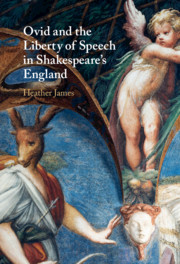Book contents
- Ovid and the Liberty of Speech in Shakespeare’s England
- Ovid and the Liberty of Speech in Shakespeare’s England
- Copyright page
- Contents
- Figures
- Acknowledgments
- Introduction Taking Liberties
- Chapter 1 Flower Power
- Chapter 2 Loving Ovid
- Chapter 3 Shakespeare’s Juliet
- Chapter 4 In Pursuit of Change
- Chapter 5 The Trial of Ovid
- Epilogue Ovid in the Hands of Women
- Bibliography
- Index
Introduction - Taking Liberties
Poetry and the Liberty of Speech
Published online by Cambridge University Press: 18 June 2021
- Ovid and the Liberty of Speech in Shakespeare’s England
- Ovid and the Liberty of Speech in Shakespeare’s England
- Copyright page
- Contents
- Figures
- Acknowledgments
- Introduction Taking Liberties
- Chapter 1 Flower Power
- Chapter 2 Loving Ovid
- Chapter 3 Shakespeare’s Juliet
- Chapter 4 In Pursuit of Change
- Chapter 5 The Trial of Ovid
- Epilogue Ovid in the Hands of Women
- Bibliography
- Index
Summary
This chapter introduces the concept of parrhesia (licentia in Latin) and, in particular, its hitherto unexplored relationship to the idea of poetic license (also licentia in Latin). It further establishes the pivotal, galvanizing role played by Ovid, the boldest poet of the Augustan age, in passing down to early modern English writers the model and theory of poetic indecorum as a form of political resistance. It finally considers the role played by Augustus’s banishment of the poet, Ovid, in the history of early modern English poetry and political thought.
Keywords
- Type
- Chapter
- Information
- Publisher: Cambridge University PressPrint publication year: 2021

